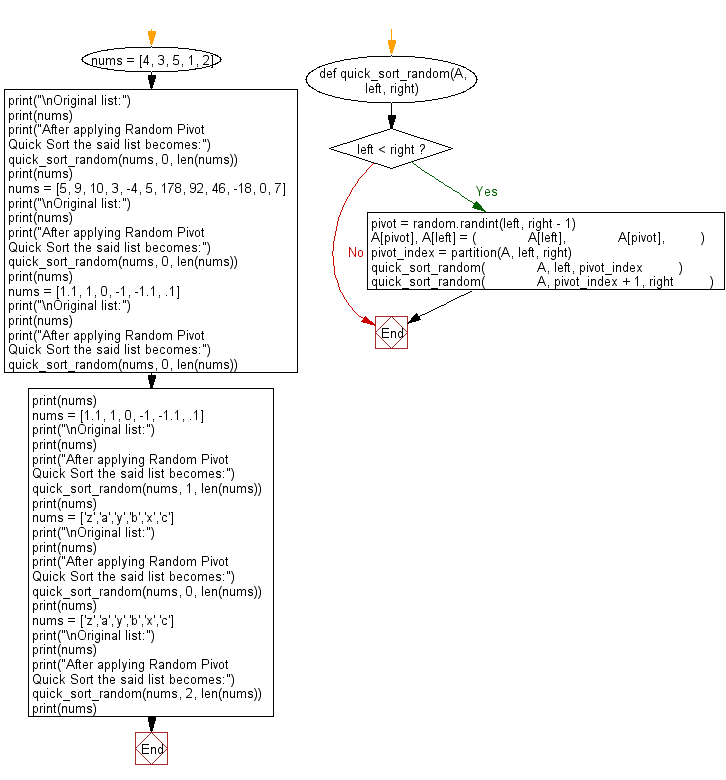Python: Sort unsorted numbers using Random Pivot Quick Sort
31. Random Pivot Quick Sort
Write a Python program to sort unsorted numbers using Random Pivot Quick Sort. Pick a random index as the pivot.
Sample Solution:
Python Code:
#Ref.https://bit.ly/3pl5kyn
import random
def partition(A, left_index, right_index):
pivot = A[left_index]
i = left_index + 1
for j in range(left_index + 1, right_index):
if A[j] < pivot:
A[j], A[i] = A[i], A[j]
i += 1
A[left_index], A[i - 1] = A[i - 1], A[left_index]
return i - 1
def quick_sort_random(A, left, right):
if left < right:
pivot = random.randint(left, right - 1)
A[pivot], A[left] = (
A[left],
A[pivot],
) # switches the pivot with the left most bound
pivot_index = partition(A, left, right)
quick_sort_random(
A, left, pivot_index
) # recursive quicksort to the left of the pivot point
quick_sort_random(
A, pivot_index + 1, right
) # recursive quicksort to the right of the pivot point
nums = [4, 3, 5, 1, 2]
print("\nOriginal list:")
print(nums)
print("After applying Random Pivot Quick Sort the said list becomes:")
quick_sort_random(nums, 0, len(nums))
print(nums)
nums = [5, 9, 10, 3, -4, 5, 178, 92, 46, -18, 0, 7]
print("\nOriginal list:")
print(nums)
print("After applying Random Pivot Quick Sort the said list becomes:")
quick_sort_random(nums, 0, len(nums))
print(nums)
nums = [1.1, 1, 0, -1, -1.1, .1]
print("\nOriginal list:")
print(nums)
print("After applying Random Pivot Quick Sort the said list becomes:")
quick_sort_random(nums, 0, len(nums))
print(nums)
nums = [1.1, 1, 0, -1, -1.1, .1]
print("\nOriginal list:")
print(nums)
print("After applying Random Pivot Quick Sort the said list becomes:")
quick_sort_random(nums, 1, len(nums))
print(nums)
nums = ['z','a','y','b','x','c']
print("\nOriginal list:")
print(nums)
print("After applying Random Pivot Quick Sort the said list becomes:")
quick_sort_random(nums, 0, len(nums))
print(nums)
nums = ['z','a','y','b','x','c']
print("\nOriginal list:")
print(nums)
print("After applying Random Pivot Quick Sort the said list becomes:")
quick_sort_random(nums, 2, len(nums))
print(nums)
Sample Output:
Original list: [4, 3, 5, 1, 2] After applying Random Pivot Quick Sort the said list becomes: [1, 2, 3, 4, 5] Original list: [5, 9, 10, 3, -4, 5, 178, 92, 46, -18, 0, 7] After applying Random Pivot Quick Sort the said list becomes: [-18, -4, 0, 3, 5, 5, 7, 9, 10, 46, 92, 178] Original list: [1.1, 1, 0, -1, -1.1, 0.1] After applying Random Pivot Quick Sort the said list becomes: [-1.1, -1, 0, 0.1, 1, 1.1] Original list: [1.1, 1, 0, -1, -1.1, 0.1] After applying Random Pivot Quick Sort the said list becomes: [1.1, -1.1, -1, 0, 0.1, 1] Original list: ['z', 'a', 'y', 'b', 'x', 'c'] After applying Random Pivot Quick Sort the said list becomes: ['a', 'b', 'c', 'x', 'y', 'z'] Original list: ['z', 'a', 'y', 'b', 'x', 'c'] After applying Random Pivot Quick Sort the said list becomes: ['z', 'a', 'b', 'c', 'x', 'y']
Flowchart:

For more Practice: Solve these Related Problems:
- Write a Python program to implement quick sort that chooses a random pivot and then prints the pivot and resulting partitions.
- Write a Python script to sort a list using random pivot quick sort and count the average number of comparisons over multiple runs.
- Write a Python program to implement random pivot quick sort and verify that the sorted output matches that of the built-in sort.
- Write a Python function to perform random pivot quick sort on a list of integers and then analyze its performance on nearly sorted data.
Go to:
Previous: Write a Python program to sort unsorted numbers using Recursive Bubble Sort.
Next: Write a Python program to sort unsorted numbers using Multi-key quicksort.
Python Code Editor:
Contribute your code and comments through Disqus.
What is the difficulty level of this exercise?
Test your Programming skills with w3resource's quiz.
